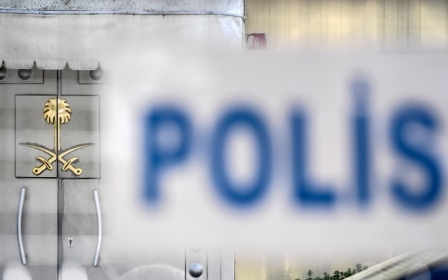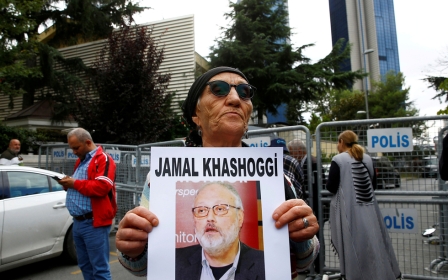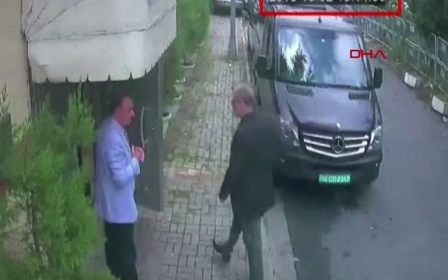Saudi-funded art show in US extols freedom as country cracks down on critics

NEW YORK, United States – Saudi Arabia has funded a yearlong series of art shows in some of New York's top galleries, touching on religion, feminism, refugees and homosexuality.
Still, the event comes amid a Saudi crackdown on perceived government critics, including journalist Jamal Khashoggi, who disappeared last week in Istanbul.
The Arab Art and Education Initiative is a series of events aimed at building bridges between the Arab world and top New York art galleries, including the Museum of Modern Art and the Guggenheim Museum.
Despite an agenda that advocates freedom of expression, critics point to one of the festival’s key backers, Saudi Arabia’s de facto ruler, Crown Prince Mohammed bin Salman (MBS), who is accused of suppressing such liberties in the Gulf kingdom.
Events at the Metropolitan Museum of Art and other Manhattan institutes have opened under the cloud of Khashoggi's disappearance. A columnist for the Washington Post who had been living in self-imposed exile in the US, Khashoggi is feared to have been killed or kidnapped in Turkey after criticising bin Salman’s aggressive agenda.
Lyndal Rowlands, an advocate with Civicus, a civil rights campaign group, said bin Salman’s spending on foreign PR firms and art projects in the US was whitewashing the rights abuses he is accused of back in the Middle East.
It’s long been clear to those who follow Saudi politics that MBS’ recent overtures to the West with art projects and magazine covers have been little more than window dressing
- Lyndal Rowlands, Civicus
“It’s long been clear to those who follow Saudi politics that MBS’ recent overtures to the West with art projects and magazine covers have been little more than window dressing,” Rowlands told Middle East Eye.
“This was obvious when the Saudi kingdom locked up the very women who campaigned for the driving ban to be lifted and has become crystal clear in recent months as more and more activists and journalists face death for speaking out.”
The art exhibition is backed and partly funded by the Misk Art Institute, which bin Salman established last year to promote Arab art. As part of the festival, Misk’s director, Saudi doctor-turned-artist Ahmed Mater, will speak at Columbia University on 22 October.
No Saudi pressure on artworks
The first show, called Syria, Then and Now: Stories from Refugees a Century Apart, opens at the Brooklyn Museum on Saturday. It features artefacts from medieval Raqqa alongside works by contemporary artists in response to the refugee crisis.
It showcases the work of Syrian artist Issam Kourbaj, who fashioned small model refugee boats from old bicycle parts and burned-out matches to depict the harrowing ordeal faced by his countrymen on risky Mediterranean crossings.
Works by Mohamad Hafez and Ginane Makki Bacho also tackle migrants’ hardships, in the hope that visitors “think for a moment what would happen if they were refugees themselves,” said the show’s curator, Aysin Yoltar-Yildirim.
Speaking with MEE, Yoltar-Yildirim noted the allegations linking Riyadh to the disappearance of Khashoggi, a prominent journalist who went missing last week after visiting the Saudi consulate in Istanbul.
“We can’t control what our leaders do,” Yoltar-Yildirim said.
Yoltar-Yildirim added that, even though Misk wholly funded the project at Brooklyn Museum, it played no role in deciding which works were presented in the show, which runs until 13 January.
We can’t control what our leaders do
- Aysin Yoltar-Yildirim, artist
Bin Salman “doesn’t dictate what is our end product. He has to live with the exhibition that we present at the end of the day,” Yoltar-Yildirim said. She noted, however, that a comparable expo on the Saudi-led coalition’s war in Yemen would be a non-starter.
Razan Al Sarraf, a Kuwait-born, US-based artist who curated a show called Young Arab Artists, which opens at ArtX, a makeshift gallery in the trendy Meatpacking District, on Sunday, expressed similar views.
That exhibition features Sarraf’s cartoonish portraits of fighters from the Islamic State (IS) group, alongside Farah Salem’s photo essay on abaya-clad women and Tareq Sultan’s take on Kuwait’s gay scene.
Sarraf told MEE she had free rein to display her trailblazing work.
“I had complete freedom to curate this show on what I want," she said.
"There was no censorship holding me back, which is why I decided to go all out, get terrorists, LGBTQ artists, get feminists."
Khashoggi disappearance a 'serious situation'
Still, the festival opens amid growing scrutiny on Riyadh over the disappearance of Khashoggi and a crackdown on Saudis who criticise bin Salman as he rolls out his ambitious Vision 2030 reform agenda.
The pressure intensified on Wednesday, with US President Donald Trump urging Saudi Arabia to explain what happened to Khashoggi and saying he wanted to get the bottom of what he called “a very serious situation”.
In a fresh clue, a pro-government Turkish daily published evidence from investigators it said identified a 15-member Saudi intelligence squad involved in Khashoggi’s unexplained disappearance on 2 October.
Khashoggi, a former newspaper editor and prominent critic of bin Salman’s war in Yemen and other policies, was last seen entering the Saudi consulate in Istanbul to get documents for his planned marriage.
His Turkish fiance, Hatice Cengiz, who was waiting outside, said he never re-appeared. Turkish sources said they believe Khashoggi was killed inside the building and removed, allegations that Riyadh dismisses as baseless.
Bin Salman has received praise and support from the Trump administration for his pursuit of privatising the country’s oil company Aramco, finding jobs for Saudi youth and loosening ultra-strict rules that banned cinemas and women drivers.
But critics say he has also clamped down on intellectual freedoms with a wave of arrests of academics, writers and religious figures, as Riyadh asserts itself regionally against perceived Iranian expansionism in Yemen, Syria and Lebanon.
This has coupled with efforts to burnish Saudi’s image overseas. In the US, Riyadh has spent millions of dollars on Washington lobbying and public relations firms, as well as think-tanks.
New MEE newsletter: Jerusalem Dispatch
Sign up to get the latest insights and analysis on Israel-Palestine, alongside Turkey Unpacked and other MEE newsletters
Middle East Eye delivers independent and unrivalled coverage and analysis of the Middle East, North Africa and beyond. To learn more about republishing this content and the associated fees, please fill out this form. More about MEE can be found here.




